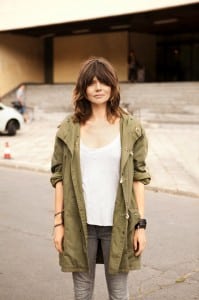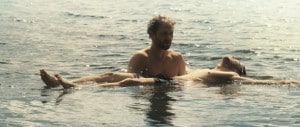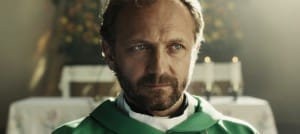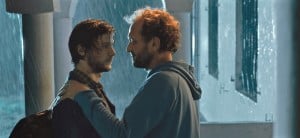 Having dipped her toes in international cinema, with her French based production ELLES, Polish filmmaker Malgorzata Szumowska has since returned to her native country for the poignant drama In the Name Of. In a film that depicts repressed homosexuality in the Catholic Church, Szumowska discusses her own religious background and influences in making this production. She also tells us about the varying reactions to the film, how she went about casting unprofessional actors – and whether or not she can see a future for herself as a director, outside Poland.
Having dipped her toes in international cinema, with her French based production ELLES, Polish filmmaker Malgorzata Szumowska has since returned to her native country for the poignant drama In the Name Of. In a film that depicts repressed homosexuality in the Catholic Church, Szumowska discusses her own religious background and influences in making this production. She also tells us about the varying reactions to the film, how she went about casting unprofessional actors – and whether or not she can see a future for herself as a director, outside Poland.
The film gets off to an uncomfortable start, with the young boys teasing somebody and making him eat ants – why did you decide to throw the audience in at the deep end so early on, and create this tense atmosphere from the word go?
MS: I felt from the beginning we wanted to make this feel like a documentary, to show this rural village and we used real people from the village in the film. We have only a few actors, and the rest are people from the village, like all of the boys, they are not actors. Also the movement of the camera, we were trying to follow them and we had a plan from the beginning to create a special atmosphere in this countryside, to show that the setting is also a hero of the film somehow. Myself and Michal (Englert) have made four documentaries together, including two in the same place in the countryside in Poland, so we wanted to give off a similar feeling to make this story believable and more powerful.
It’s incredible that you were using unprofessional actors, it must have been inspiring that you were able to find such raw talent in such a small town?
MS: It’s funny because a young director recently asked me how I went about communicating with these boys, because they were kind of dangerous, I mean, some of them are from pathological families and hardcore boys. So you just have to be in their skin and behave like them, and I did it. I had a very big group then I chose eight of them, and I chose them by screaming with them, dancing with them, playing football, and they started to treat me not like a lady from the big city, but a friend, older, but a friend. Then I took this group and we spent a week together without shooting, including actors, and we’d play football, drink beer, talking… Just to give them the feeling that we aren’t any different than they are, and also to observe them. Afterwards it was pretty easy to be honest, the first two weeks before shooting it was hard and I wasn’t sure if it would work out, but because we created this special atmosphere, it works.
Were you any good at football?
MS: [Laughs] I’m not, but they were! I was trying but it was more for fun.
 There are several severe themes in this film, how much did you have to explain to these kids about the context, and were their parents involved at all?
There are several severe themes in this film, how much did you have to explain to these kids about the context, and were their parents involved at all?
MS: They were all more or less 18, we tried not to have any kids. The parents didn’t care about them, because it’s very complicated, sometimes there is only a mother, or their parents are alcoholics, it’s a really brutal Polish countryside. For them it was very good they could have some money, a bit like a job on holiday. It’s not such a civilised part of Poland, and it was a kind of experiment, but they all came to the premiere in Warsaw and it was the first time they had been there, and it was very touching.
The rural setting is so important to this film, it’s an angry place for Adam to live – was it metaphorical of the homophobia that he suffers?
MS: Yes definitely, because if I put the story into the big city the priests are in different positions and people are different in Warsaw and the provinces. The provinces are very homophobic and close-minded and the people are really focused around the church, but for pragmatic reasons more than for metaphysic ones. The people are simply poor, and I wanted to portray this part of the country because it’s like 80% of Poland. Poland is not Warsaw or Krakow, it’s just the provinces, and for me it was important to show what a Polish province is. Very important to put the priest into that setting.
As one of the biggest Polish filmmakers working today – do you almost feel a responsibility to show the world what is going on in your native country?
MS: Yes, definitely. I got the feeling that I wanted to show people what’s happening in Polish provinces, Polish churches, Polish streets, and Poland’s attitudes to homosexual people and I was concentrating on this part. However I was also concentrating on the love story. In my next film I want to say something else about Poland and maybe more deeper.
Your previous film ELLES was shot over in France, do you think that helped you go back to Poland with a new perspective?
MS: Definitely. For me it was a very hard experience. Even though I had an amazing relationship with Juliette Binoche, who I am planning on making another movie with – it was very tough for me. I didn’t speak French, I had to move to Paris, I had to work with people I didn’t know and it was a lot of pressure from production, the film has to be like this or like that, you know what I mean? Finally, it was a traumatic experience, even though I like the film. But it was such a pleasure to get back to Poland and I just wanted to make a small Polish film only with Polish people and no co-production and it gives me a perspective that I want to say something about Poland, because I was outside for a while. Now I really find myself as a Polish director, with Polish roots and I understand that for me it’s better to tell the stories that are really connected to my country of origin, because Poland is very interesting. It’s a strange country, and it’s not multicultural, which is a pity, it’s very local – we have only Poles living in Poland, which is terrible because it puts the society in a locked position. At the same time, it’s very interesting our history, like the Second World War, the German occupation, the Russian occupation, and suddenly in the 90s we had capitalism, it’s terrible and everybody freaked out and wanted money to buy all of these colourful things, and now the current generation in Poland are extremely international and speak many languages. It’s an interesting mixture and you can talk about it in the movies, more than here in the UK I think, because here or in France everything is so obvious somehow.
Another very important theme is the Catholic Church – as a Catholic growing up yourself, was religion and faith an area you always wanted to explore in film?
MS: Definitely. My parents used to be communists and they were atheists, so I didn’t grow up as a Catholic, then my father switched and then I became a Catholic when I was 14, I was very old. Then the next 10 years until I was 24, I was a Catholic. I was trying to explore religion very seriously, like all the metaphysic and mystic, but then I quite the church, and I was full of ideas. In the beginning when I quite the church I was twenty-something, and I had an obsession in my mind about making a movie of a believer, a priest or somebody who really believes in Jesus, as for me that was extremely interesting, as somehow I passed through and saw it from a close perspective.
 Did you therefore have to do much research, or when writing the screenplay was a lot of the material from your own personal experiences?
Did you therefore have to do much research, or when writing the screenplay was a lot of the material from your own personal experiences?
MS: We did research and I spoke with a few priests. Also I met a man who used to be a priest but he got married, and is a very famous professor of anthropology and he helped a lot and he came to Berlin for the premiere and he appreciated the film. We didn’t do a huge amount of research though, and that’s why I can see that Poland really is a country of paradox, because the reaction is very complex. People from the right wing think it’s terrible, but I expected that, it’s not unique to hear this. But from the other hand, people on the left, they don’t like the film because it’s not radical enough, it doesn’t attack the church enough. Now there’s a gay priest who gave his story to a newspaper, and it’s much more violent than what we showed in the film. It’s another discussion, but he said, ‘I’m a priest and I’m a homosexual and I’m fucking around all the time. I cannot stop myself, I have five or six boys a week’. Comparing that to our film, which is like poetry! A lot of people went to see the film in Poland and we had a good box office, but we had good reviews and bad reviews, but it’s very emotional, people love to discuss it, which is good.
Did you feel any apprehensions when dealing with religion in film, knowing of the potential backlash? Or do you welcome the inevitable debate?
MS: I welcome it. I’ve never been afraid to touch the matter. Nobody did it in Poland and I’m the first one, and I’m fine with this, we should do this somehow in Polish cinema, otherwise it doesn’t make any sense to be in such a religious country. But no, I wasn’t worried.
It must be fascinating for you when travelling across the world at various film festivals, to see how different countries react to the film?
MS: Oh it’s very, very interesting. I’m not travelling that much because I have a small baby and I’m trying to work on my next films, but when I am travelling I always get completely different reactions. For example in London at a screening I went to, it was only young people, and half of them were Polish people and the other half was their English friends, but they all liked the film. Apart from this one Polish, old lady and she was yelling “This is terrible”. It’s so interesting to see their reaction.
Do you find it more interesting to speak to somebody who does like the movie, or somebody who doesn’t?
MS: To be honest, I prefer speaking to the people who love it [laughs]. To explain to somebody who really doesn’t like it, it’s very hard because we are so far away that we can’t really talk, it’s complicated. I try to avoid these people!
Talking of film festivals, you won the Teddy Award in Berlin – that must have been a great moment for you?
MS: Yeah it was amazing, especially that we kept joking with friends that we should get the Teddy Award because we go back to Poland and be like, “Yeah, look at this!” and yeah it happened. It’s a very good award and opens a lot of doors, and it’s a stamp of tolerance and I treat it very seriously. Afterwards we have collected many awards, the film now has more then 10 awards and it’s still travelling. Also, there is a nomination to the European Film Awards which is very cool.
 When you win an award like this, does that help you get more creative license when you want to make your next film?
When you win an award like this, does that help you get more creative license when you want to make your next film?
MS: For me it really helped, but from a professional perspective, the best thing was that the film was in competition at Berlin. It’s really helpful because usually it’s so hard to have a film in competition in Berlin, Venice or Cannes, because they take only 15 or 16 movies, and if you are in this selection you have an almost stamp of quality. I think this will make it easier to do the next films now. Also, Elles was very helpful because is sold out in so many countries.
Talking of Elles, both that and In The Name Of deal with corrupt worlds where sexuality are very prevalent themes – what is it about this particular world you wanted to explore?
MS: It was a moment in my life when I was interested in exploring people like this. In Elles it was women’s sexuality, and for me it was a taboo because I haven’t seem many movies about women’s sexuality, so I had a feeling maybe it wasn’t understood well because I showed it only from a woman’s perspective and not too many people understand that. If I did the film now perhaps I would be more intellectual and show more spectrum, but anyway in this, we just loved the story to In the Name Of, the idea of a priest who cannot have sex because he’s not allowed and is celibate, and yet he feels such a huge desire, and for a young man who has never had sex because he comes from a pathological family, so I wanted to show this sexuality and how it awakens. It’s easy to explain because in my experience women grow up sexually when they are around 40, and maybe that’s why all of these issues regarding sexuality were interesting to me because I am in that age group, so I wanted to explore this side of human nature. Now I’ll probably turn to another direction though [laughs].
Was it helpful to have co-written the screenplay with Michal Englert then, and to have that male perspective infused into the script?
MS: Yeah definitely, but we tried not to divide. Sometimes we were laughing because I was more male and he was more female. But yes of course it’s helpful to see how he sees and feels the erotic scenes between two men are like, so yes it was interesting to work with a man.
This film is so much about the lead character Adam, so how did you decide Andrzej Chyra was perfect for this role?
MS: He is one of the most famous Polish actors of his generation, and I used to work with him in small scenes, such as in Elles, and I was always planning on making a special part for him because I knew he deserved it because he is an amazing actor. So I wrote a scenario for Andrzej and I was thinking about him from the beginning.
Is that something you often do?
MS: I will only be doing this from now on. I wrote this part for Andrzej, another part for Mateusz (Kosciukiewicz) and all the other parts for the actors I knew from the beginning were going to be involved. Now I’m writing another script the same and I’m thinking about some actors I want to use because I don’t like casting. I think it’s too hard to judge on casting, it’s an unnatural situation.
You’ve spoken about an upcoming project with Juliette Binoche – can you tell us about that?
MS: There are two projects, one is with Juliette and it’s called SISTERS. It’s an experimental film because it’s based on documentary archives I have at my home. I have loads of archives of conversations with my sister, which was a few years ago. Out of this material I am writing a scenario, and it’s very funny – I think it will be a kind of black comedy, and I found it so interesting to transfer a documentary into a feature. Also there is another small Polish project, again with Michal, as we’re writing together. It’s going to be more about Poland, but also about how people have relations with their bodies.
Do you have any long-term plans to make a film in either the UK or the US?
MS: To be honest I’ve never thought about it because it’s not for me. The producer is always the most important, and I’m afraid the UK is the same. Also the stars… You have to have the stars, and the stars tell you what to do and I cannot imagine. I like the European art house style where you have such freedom and nobody is forcing you to do anything. At the moment I’d like to keep my art house way.
Poland have a really impressive film history – the likes of Polanski, Zanussi, Wajda… Are there any in particular that really inspired you though?
MS: Yeah all of them. Of course I admire Polanski and his work, but there are so many who are inspiring. At the same time, the younger generation are rejecting this, we want to do something different, which is typical. But we are really under the influence of all of these masters of Polish cinema, even sub-consciously. STEFAN PAPE
IN THE NAME OF is on current release at selected cinemas including the CURZON SOHO AND ODEON PANTON STREET, LONDON from 27th September 2013